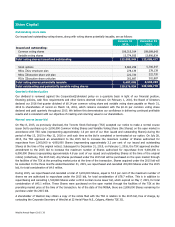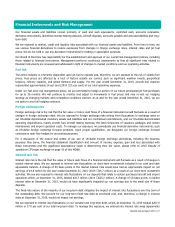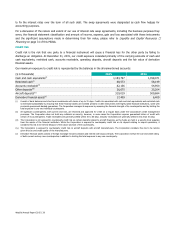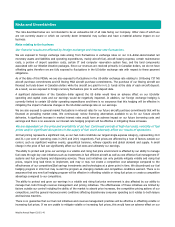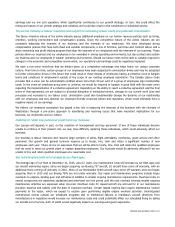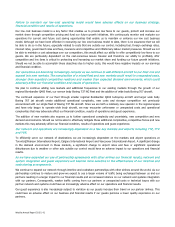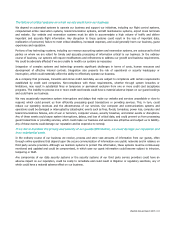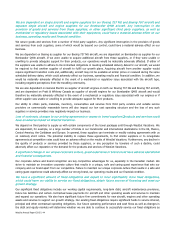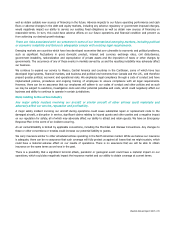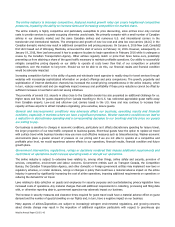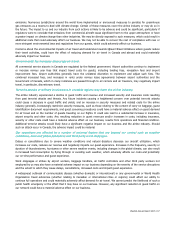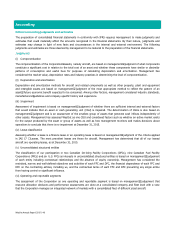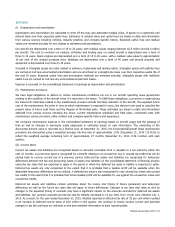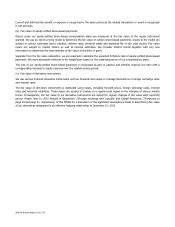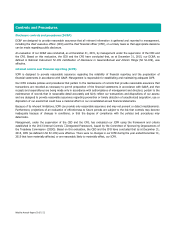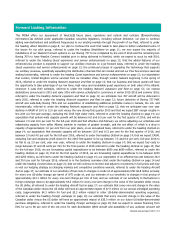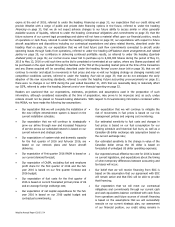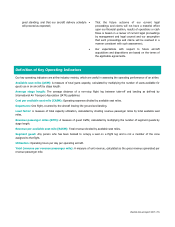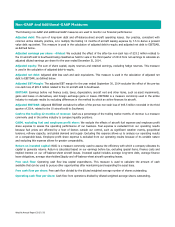Westjet 2015 Annual Report Download - page 48
Download and view the complete annual report
Please find page 48 of the 2015 Westjet annual report below. You can navigate through the pages in the report by either clicking on the pages listed below, or by using the keyword search tool below to find specific information within the annual report.WestJet Annual Report 2015 | 46
The airline industry is intensely competitive. Reduced market growth rates can create heightened competitive
pressures, impacting the ability to increase fares and increasing competition for market share.
The airline industry is highly competitive and particularly susceptible to price discounting, since airlines incur only nominal
costs to provide services to guests occupying otherwise unsold seats. We primarily compete with a small number of Canadian
airlines in our domestic market and the same Canadian airlines and numerous U.S. and international carriers in the
transborder and international markets. The emergence and growth of new low cost and ultra low cost carriers (ULCC) in the
Canadian domestic market may result in additional competition and pricing pressures. On January 6, 2016 New Leaf, Canada’s
first ULCC based out of Winnipeg, Manitoba, announced the start of service on February 12, 2016. However, subsequently on
January 19, 2016, New Leaf announced it has to postpone its plans to begin operations in February 2016 while it undergoes a
review by the Canadian Transportation Agency. Other airlines regularly match or price their fares below ours, potentially
preventing us from attaining a share of the guest traffic necessary to maintain profitable operations. Our ability to successfully
mitigate competitive pricing depends on our ability to operate at costs lower than that of our competitors or potential
competitors over the medium to long term. Should we not be able to do this, our financial results and financial condition
would be adversely impacted.
Increasing competition further is the ability of guests and wholesale travel agencies to readily shop for travel services through
websites with increasingly sophisticated information on product offerings and price comparisons. The growth, popularity and
sophistication of Internet distribution channels has increased the overall pricing competitiveness in the airline industry, which
in turn, reduces overall yield and can negatively impact revenues and profitability if these price reductions cannot be offset by
sufficient increases in load factor and cost saving initiatives.
The proximity of several U.S. airports in cities close to the Canadian border has also presented an additional challenge for us.
Higher taxes and fees for guests departing from Canada travelling to the U.S. has redirected appreciable guest traffic away
from Canadian airports. Low-cost and ultra-low cost carriers based in the U.S. have and may continue to increase their
capacity at these airports to attract Canadian-originating, price-sensitive, leisure guests.
General and macroeconomic conditions may adversely affect our business, operating results and financial
condition, especially in markets where we have a significant presence. Weaker economic conditions can lead to
a reduction in discretionary spending and a corresponding decrease to our bookings and the price our guests
are willing to pay.
Our business is sensitive to changes in economic conditions, particularly as it affects discretionary spending for leisure travel,
the larger proportion of our total traffic compared to business guests. Short-haul guests have the option to replace air travel
with surface travel while business travelers may use more cost effective measures such as teleconferencing. Weaker economic
environments place a greater amount of pressure on our pricing and if we are not able to operate at a competitive and
profitable price level, we would experience adverse effects to our operations, financial results, financial condition and future
growth plans.
Government intervention, regulations, rulings or decisions rendered that impose additional requirements and
restrictions on operations could increase operating costs or disrupt our operations.
The airline industry is subject to extensive laws relating to, among other things, airline safety and security, provision of
services, competition, environment and labour concerns. Government entities such as Transport Canada, the Competition
Bureau, the Canadian Transportation Agency, and other domestic or foreign government entities may implement new laws or
regulatory schemes, or render decisions, rulings or changes in policy that could have a material adverse impact on the airline
industry in general by significantly increasing the cost of airline operations, imposing additional requirements on operations or
reducing the demand for air travel.
Laws relating to data collection on guests and employees for security purposes and counterbalancing privacy legislation have
increased costs of operations. Any material changes that add additional requirements to collecting, processing and filing data
with, or otherwise reporting data to, government agencies may adversely impact our business.
The increase in security measures and clearance times required for guest travel could have a material adverse effect on guest
demand and the number of guests travelling on our flights and, in turn, have a negative impact on our business.
Many aspects of airlines’ operations are subject to increasingly stringent environmental regulations, and growing concerns
about climate change may result in the imposition of additional regulation particularly with respect to greenhouse gas


